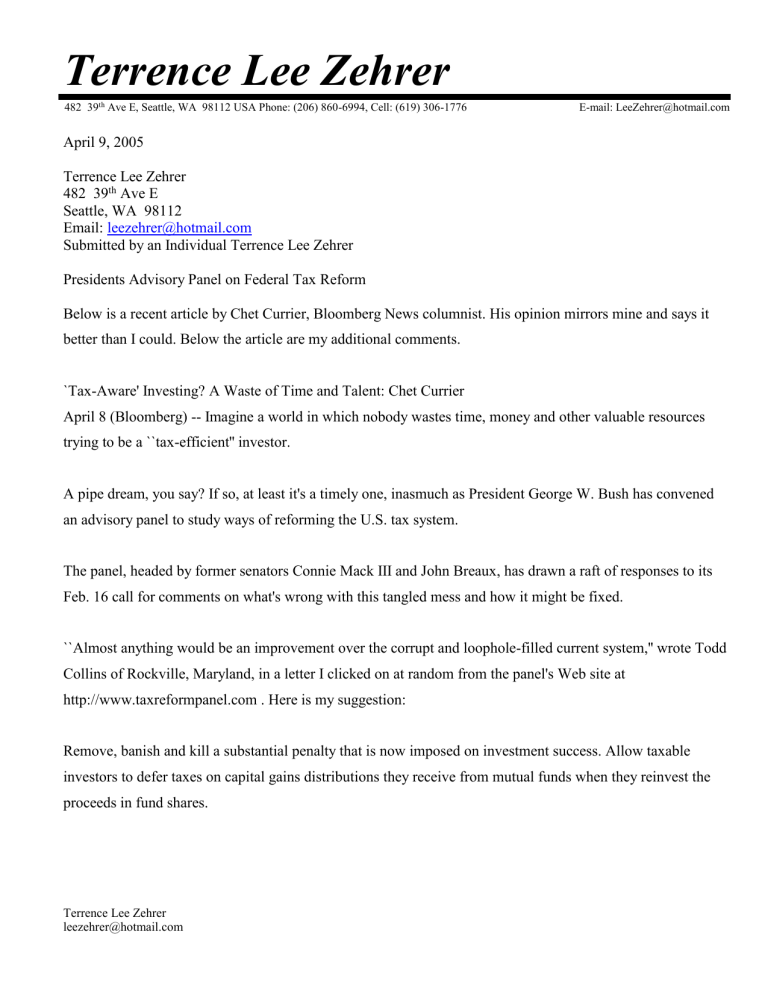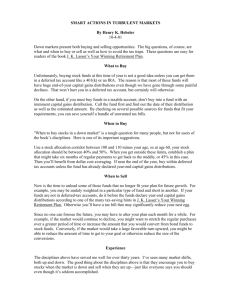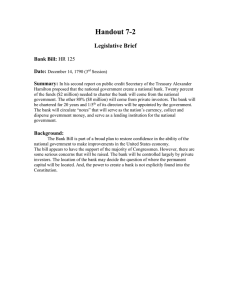Terrence Lee Zehrer

Terrence Lee Zehrer
482 39 th Ave E, Seattle, WA 98112 USA Phone: (206) 860-6994, Cell: (619) 306-1776
April 9, 2005
E-mail: LeeZehrer@hotmail.com
Terrence Lee Zehrer
482 39 th Ave E
Seattle, WA 98112
Email: leezehrer@hotmail.com
Submitted by an Individual Terrence Lee Zehrer
Presidents Advisory Panel on Federal Tax Reform
Below is a recent article by Chet Currier, Bloomberg News columnist. His opinion mirrors mine and says it better than I could. Below the article are my additional comments.
`Tax-Aware' Investing? A Waste of Time and Talent: Chet Currier
April 8 (Bloomberg) -- Imagine a world in which nobody wastes time, money and other valuable resources trying to be a ``tax-efficient'' investor.
A pipe dream, you say? If so, at least it's a timely one, inasmuch as President George W. Bush has convened an advisory panel to study ways of reforming the U.S. tax system.
The panel, headed by former senators Connie Mack III and John Breaux, has drawn a raft of responses to its
Feb. 16 call for comments on what's wrong with this tangled mess and how it might be fixed.
``Almost anything would be an improvement over the corrupt and loophole-filled current system,'' wrote Todd
Collins of Rockville, Maryland, in a letter I clicked on at random from the panel's Web site at http://www.taxreformpanel.com . Here is my suggestion:
Remove, banish and kill a substantial penalty that is now imposed on investment success. Allow taxable investors to defer taxes on capital gains distributions they receive from mutual funds when they reinvest the proceeds in fund shares.
Terrence Lee Zehrer leezehrer@hotmail.com
This could be done directly with a new provision in the Tax Code. Or it could be achieved indirectly by creating universal tax-deferred savings accounts, as Bush first proposed more than two years ago. These would operate on similar lines to the present individual retirement accounts and 401(k) plans.
Ancient Wisdom
Whatever the route, the goal would be the same -- to eliminate the distortions, and save the huge amounts of resources now expended, in the pursuit of investing ``tax efficiency.''
A simple principle, which is at least 2,000 years old, tells us that nobody can serve two masters. Whenever mutual-fund managers or their investors try to practice tax efficiency, they venture into that trap.
A fund that bills itself as tax-efficient, or tax-managed, or tax-aware, implicitly states that it will make some decisions about buying or selling, or not buying or selling, for tax reasons. If even one of these decisions is different from what is dictated by pure investment considerations, some opportunity cost is paid.
Now consider a fund that doesn't have a stated ``tax-savvy'' mission, but whose manager is nevertheless under pressure to show sensitivity to tax considerations. Any effort managers expend on this is of no value to those who invest through retirement accounts. These tax-deferred investors pay for a service they don't want or need.
On the Merits
Freed from taxes on gains distributions, individual investors could devote their full energy to picking funds that suited their economic needs, without worrying about ``tax- efficiency.'' They would no longer be subjected to spurious arguments that the current tax system does them a favor by steering them into lowturnover, long-term-minded funds such as index funds.
If any type of fund is inherently preferable, shouldn't its natural superiority assert itself in the marketplace, without help from a tax subsidy? It's absurd to favor some types of ``good'' funds over others via the tax system, then claim those funds are good because they are tax-efficient.
Besides, the present system doesn't always encourage long- term investing. It discourages people from buying funds that have invested well enough to build up a backlog of paper profits that will produce taxable gains distributions when the securities are sold.
It encourages investors, instead, to think about switching their money into funds with large tax-loss carryforwards accumulated by picking losing investments, since these losses can be used in future years to offset taxable gains.
By the Numbers
The biggest drag on long-term investment is a matter of simple arithmetic. Money paid in current taxes on gains distributions is money that might otherwise have been invested for the future, to the benefit of both the individual investor and the market as a whole.
This applies even if the distributions in question are automatically reinvested. True, in this situation no money is taken out of the account. But the separate cash the investor uses to pay the tax obligation represents additional money that could otherwise have been invested, in the same or some other fund.
Perhaps we don't feel the impact, indirect as it may be, of such opportunities forgone. The fact that we don't notice them doesn't mean they cause no harm.
On my Bloomberg, a search using the keywords ``tax managed'' turns up the names of 147 funds and 91 people. Just think how much time and brainpower they could devote to pursuits of actual economic value that now is frittered away on gaming an arbitrary system of tax rules.
MY COMMENTS:
But than there is the whole tax code. What if business did not need whole departments of accountants to scheme, connive and conspire for tax efficient solutions? Do you know that almost the whole leasing industry is built on the back of the tax code? Why would anyone ever want to lease if you could simple write off any investment?
How about banking? As it is, I have to pay 35% corporate taxes on income and than turn around and borrow that money from the bank (and pay interest) on any reinvestment. This is really stupid but it’s supporting the whole banking industry.
How about the whole real estate industry? The only reason I buy a house rather than renting is because I’d have to pay taxes on the income and than make my rent payment. By owning I never have that income, the money is invested in the house. If I borrow the money I can write off the interest payments. This is a waste of resources. Wouldn’t it be better if this money was invested in a high tech company that was working on AIDS research or other diseases or life extending solutions.
Terrence Lee Zehrer


